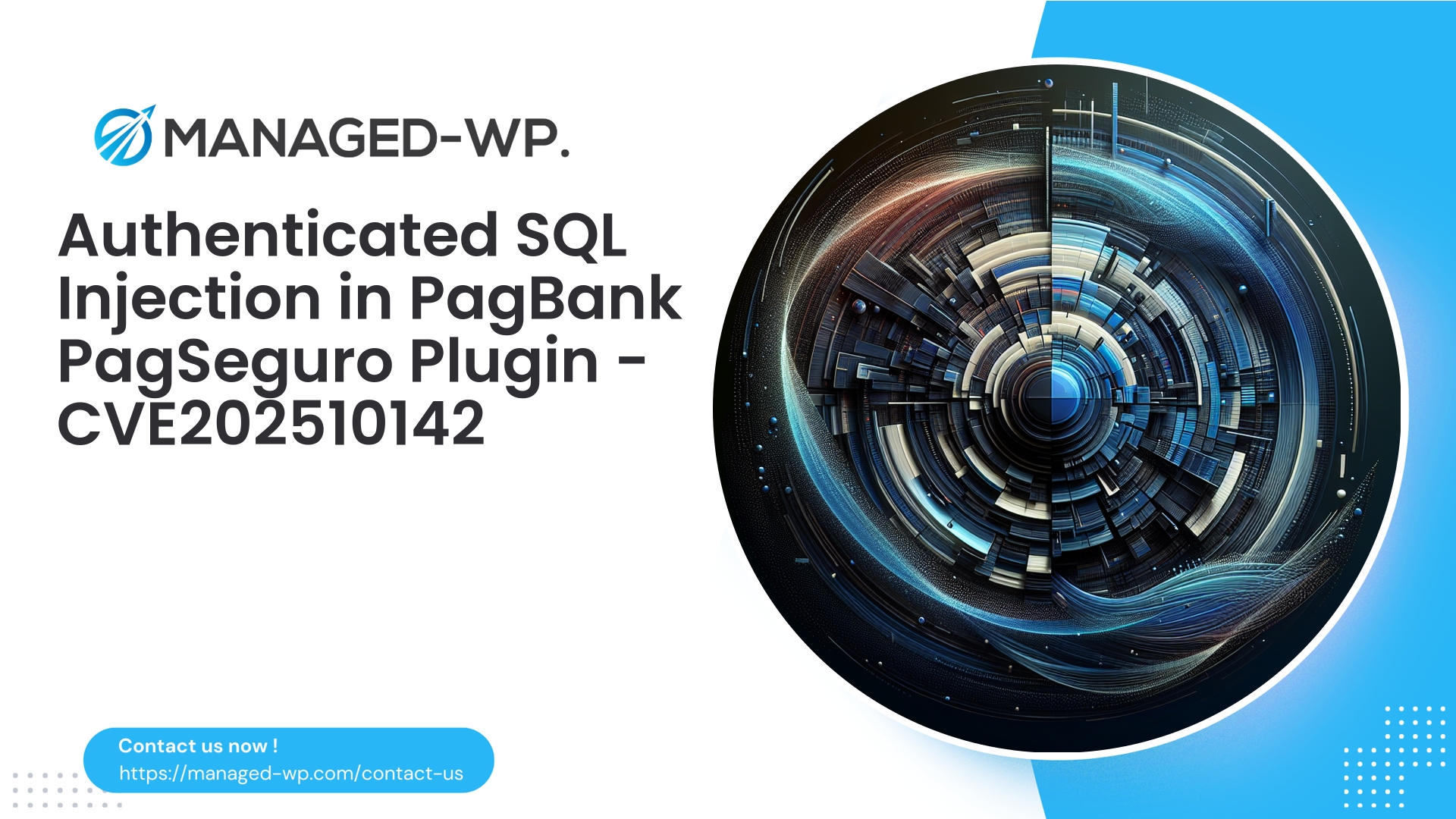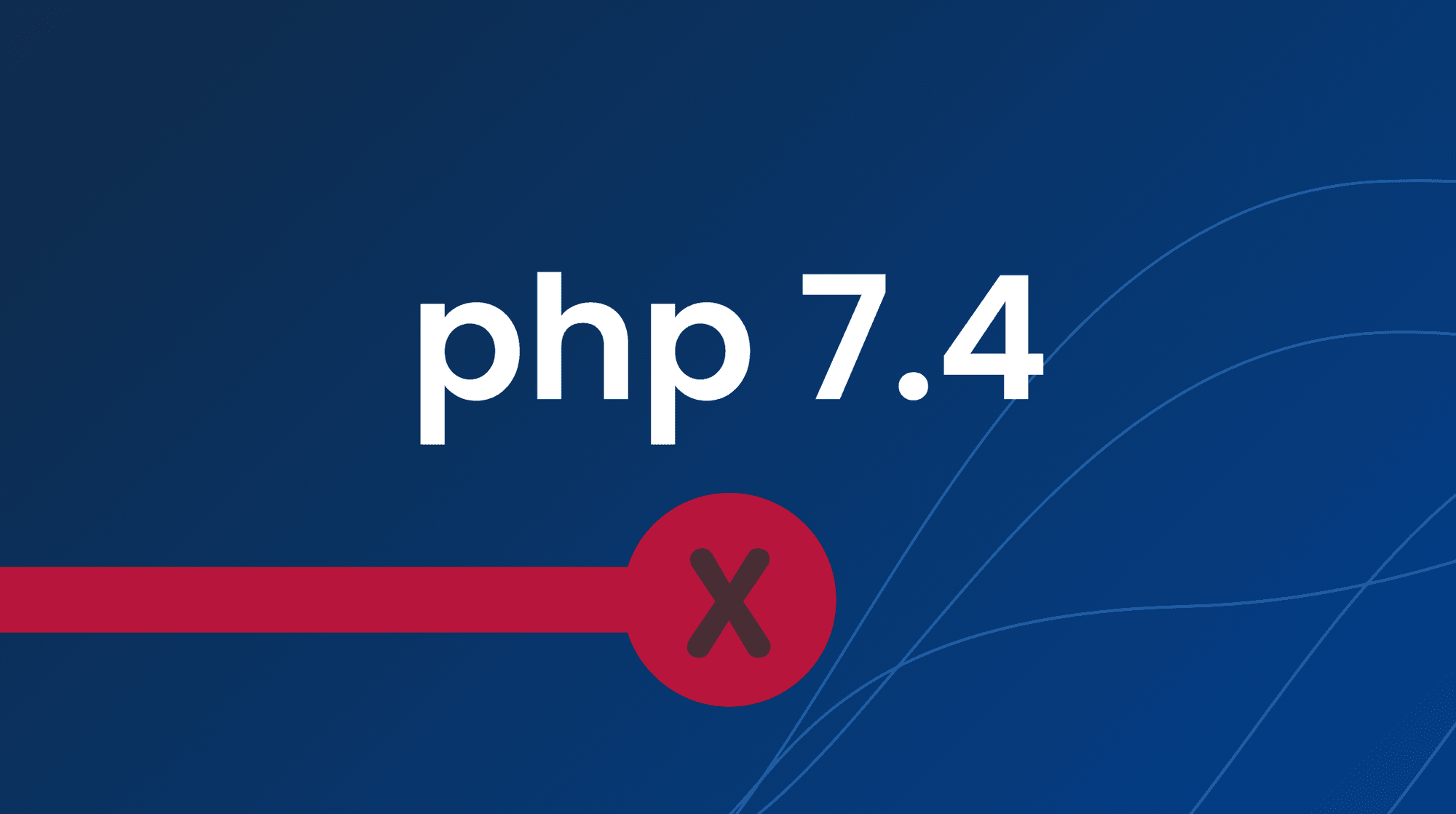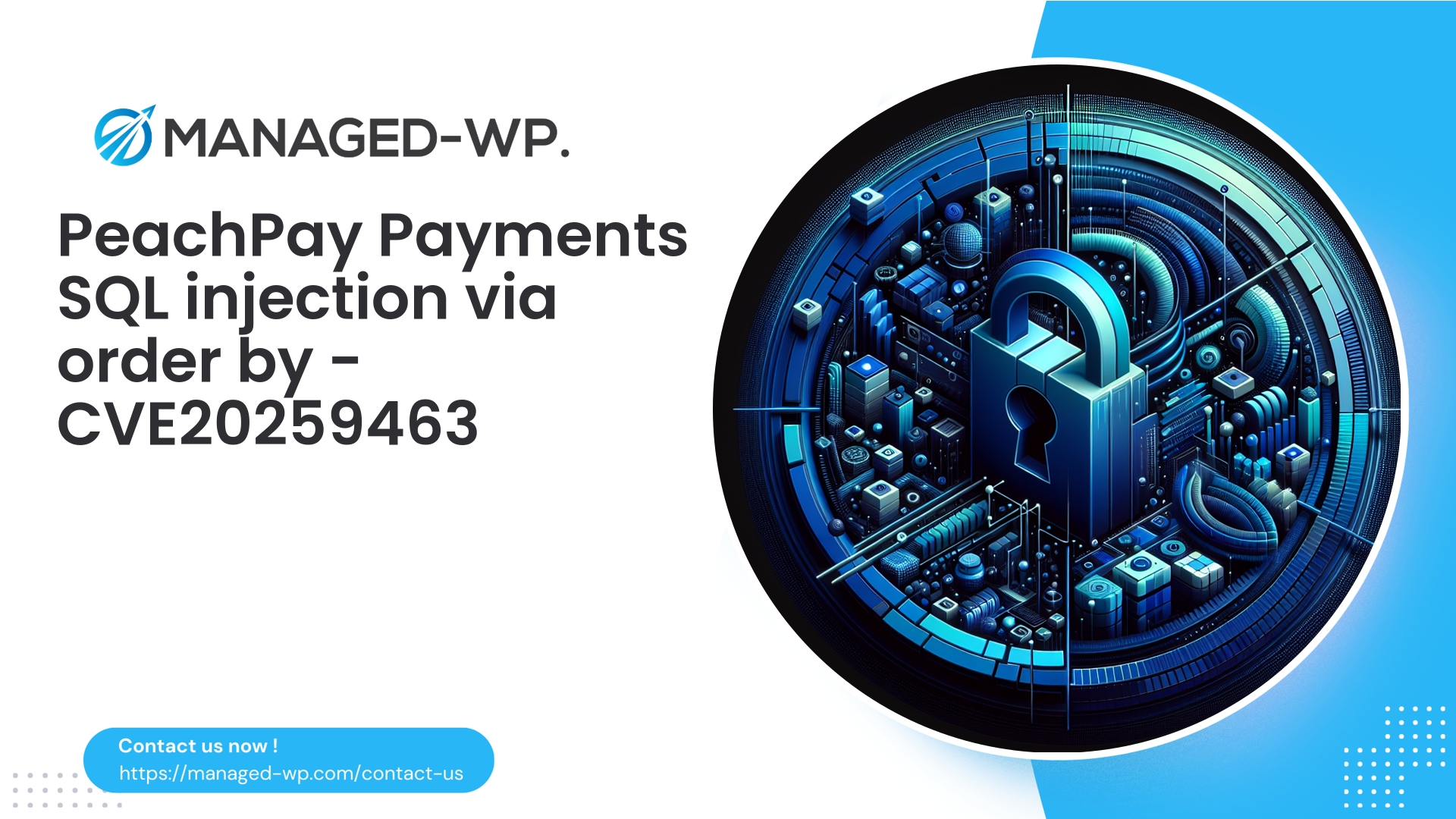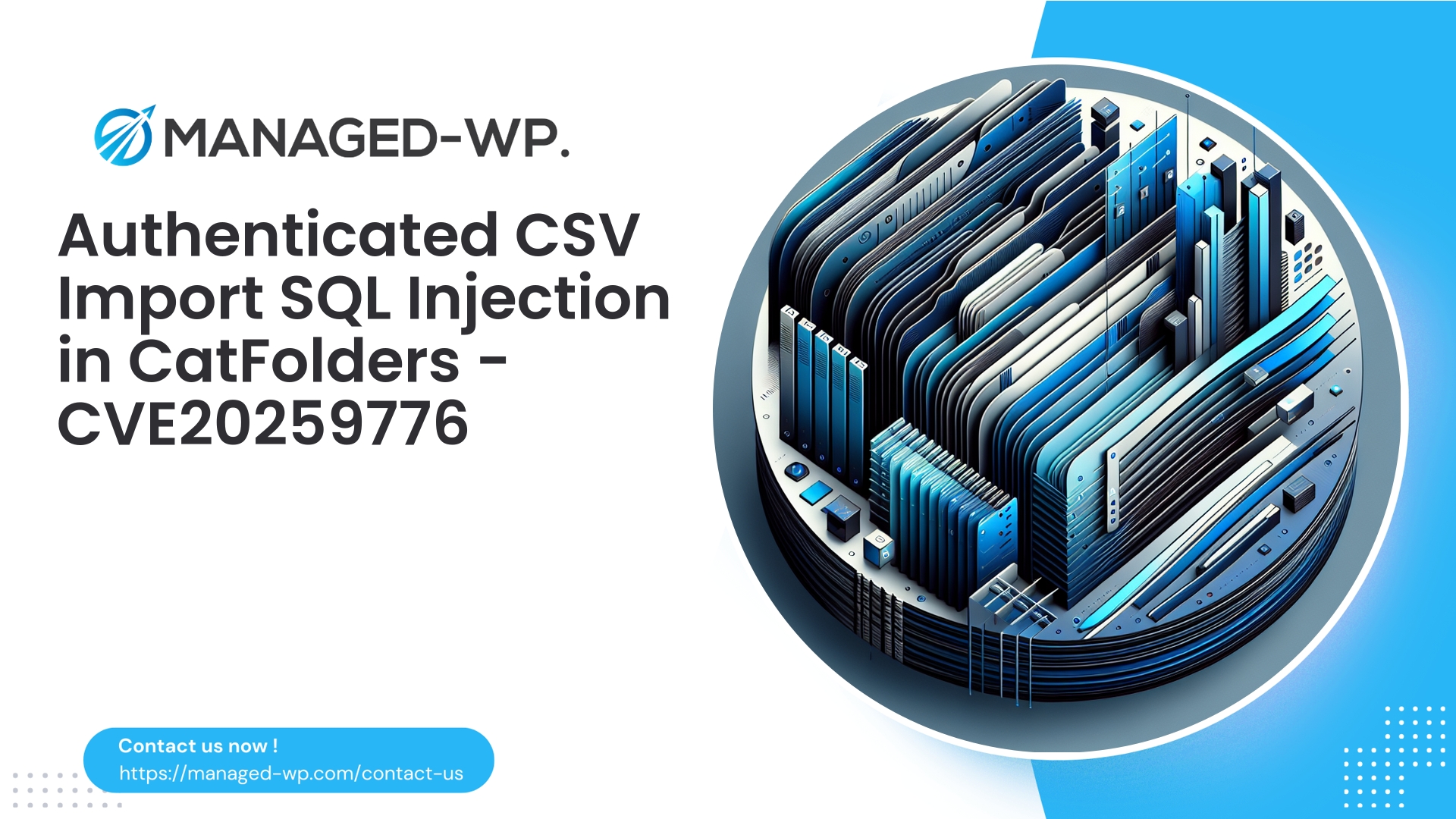| 插件名称 | PagBank / PagSeguro Connect |
|---|---|
| 漏洞类型 | SQL 注入 |
| CVE编号 | CVE-2025-10142 |
| 紧急 | 低的 |
| CVE 发布日期 | 2025-09-09 |
| 源网址 | CVE-2025-10142 |
PagBank / PagSeguro Connect (<= 4.44.3) — 已认证商店管理器 SQL 注入漏洞 (CVE-2025-10142)
在 Managed-WP,我们始终将 WordPress 环境的安全放在首位,密切监控漏洞披露情况,以便网站所有者和开发人员能够迅速做出响应。最近发现的一个 SQL 注入漏洞影响了 WooCommerce 的 PagBank / PagSeguro Connect 插件(版本 <= 4.44.3),该漏洞已被分配 CVE-2025-10142。虽然利用此漏洞需要具有 Shop Manager 或更高权限的已认证用户,但此类权限通常分配给商店员工或承包商,因此这对电子商务运营构成重大风险。
本文详细分析了漏洞的性质、潜在的攻击者策略、您可以立即实施的检测和缓解措施、开发人员关于安全编码的建议、事件响应最佳实践,以及 Managed-WP 如何在您应用必要的更新时帮助保护您的网站。
快速概要
受影响的插件:适用于 WooCommerce 版本 <= 4.44.3 的 PagBank / PagSeguro Connect
漏洞类型:已认证 SQL 注入(需要 Shop Manager+ 访问权限)— CVE-2025-10142
– 已在版本 4.44.4 中修复 — 更新不再延迟
– 如果更新不可行,则立即采取缓解措施:停用插件,限制商店管理员帐户,并部署虚拟补丁或 Web 应用程序防火墙 (WAF) 规则来阻止攻击尝试。
简而言之,这为什么重要
SQL注入(SQLi)是一种极其危险的漏洞,攻击者通过精心构造的输入,不安全地将其嵌入数据库查询中,从而可以直接从您的网站数据库中读取、修改或删除数据。
对于 WordPress 电子商务网站而言,这可能会泄露客户凭证、订单详情、支付信息,并有可能使攻击者提升权限或完全控制该网站。
此漏洞要求攻击者以店铺管理员或更高权限登录,这降低了未经身份验证的 SQL 注入攻击的风险。然而,店铺管理员角色通常与第三方人员或自动化集成共享,因此诸如网络钓鱼或撞库攻击之类的账户劫持手段仍然普遍存在。如果恶意行为者获得了店铺管理员权限,此漏洞允许他们针对您的店铺数据库执行恶意 SQL 命令。
该漏洞的 CVSS 评级为 7.6,表明在相应的权限级别下,其影响十分严重。实际损害取决于受影响的具体数据库查询以及您网站的授权控制措施。
根本原因概述(技术方面)
该漏洞源于不安全的 SQL 查询构造:用户提供的数据直接连接到 SQL 字符串中,而没有进行充分的验证或使用参数化查询。
导致 SQL 注入漏洞的典型错误包括:
- 使用 $wpdb 的原始字符串连接进行 SQL 查询,而不是利用 $wpdb->prepare。
- 未能验证或强制执行输入数据的严格数据类型。
- 未经清理就信任行政输入(来自表单或 AJAX)。
- 管理员操作缺少彻底的能力检查或 nonce 验证。
在这种情况下,拥有 Shop Manager 凭据的攻击者可以构造输入并将其注入数据库查询中,从而导致意外的 SQL 执行。
潜在攻击场景
- 通过网络钓鱼、凭证重用或内部威胁等手段入侵 Shop Manager 帐户。
- 登录 WordPress 管理后台或触发处理输入的插件端点。
- 向易受攻击的参数发送篡改后的输入,迫使数据库执行恶意 SQL。
- 提取敏感记录,例如用户电子邮件、哈希密码、订单或支付元数据,或更改订单数据或设置。
- 利用窃取的凭证和数据进一步升级权限或建立持久控制。
由于这种漏洞利用依赖于身份验证,因此攻击通常是在账户被攻破之后进行的,而不是直接的远程利用。
网站所有者需立即采取的行动(24小时内)
如果您使用此插件运营 WooCommerce 商店,请优先执行以下步骤:
- 更新插件
获取并应用版本中的关键安全补丁 4.44.4. 在流量较低的时段安排更新,并在更新后验证所有结账流程。 - 如果无法立即更新:
– 暂时停用 PagBank / PagSeguro Connect 插件,以阻止危险代码的执行。
– 通过 IP 白名单或其他访问控制来限制管理区域访问和插件端点。
– 删除或禁用所有非必要的店铺管理员帐户。 - 加强密码安全意识
重置所有店铺经理和管理员账户的密码。考虑强制其他特权用户更改密码。 - 启用双因素身份验证 (2FA)
对所有具有较高权限的账户实施双因素身份验证,以降低账户被盗用的风险。 - 审计可疑活动
监控异常管理员行为、意外用户角色变更或数据库异常情况。 - 确认当前备份。
对文件和数据库进行最新、安全的备份,以便在必要时支持调查或回滚。 - 内部沟通
通知您的团队有关漏洞的信息,更新相关凭证,并在漏洞修复之前暂时中止第三方供应商的访问权限。
检测:入侵的关键指标
注意以下可能表明存在剥削的危险信号:
- 商店管理员用户在非工作时间或异常的管理操作。
- 对具有高级权限的用户进行了意外的添加或更改。
- 网站或服务器日志中的 SQL 错误消息。
- 访问日志中插件端点附近包含 SQL 关键字或可疑语法的请求。
- 更改数据库记录,例如订单、元数据或设置。
- 异常的出站流量模式可能表明存在数据泄露。
- 同一IP地址多次登录失败后又成功登录。
日志检查示例命令:
grep -Ei "union|select|information_schema|sleep\(|or 1=1" /var/log/nginx/access.logwp user list --role=shop_manager --format=csvwp 用户获取--field=角色
注意:请谨慎操作,避免误报。许多合法的管理页面都包含“select”或“union”之类的术语。请重点关注异常上下文或编码后的有效负载。
事件响应建议
- 隔离 在分析期间,通过启用维护模式或将管理员访问权限限制在受信任的 IP 地址来保护您的 WordPress 网站。
- 保存 保留所有日志、数据库快照和相关文件,不进行覆盖,以支持取证调查。
- 重置凭据和密钥: 如果怀疑发生安全漏洞,请更新所有特权用户的密码,并轮换 API 密钥、支付密钥和数据库凭证。
- 扫描后门和恶意软件 使用可信工具和人工检查来检测持续存在的威胁。
- 通知并遵守: 如果敏感数据遭到泄露,请遵循有关数据泄露通知的法律法规要求。
- 寻求专家帮助 如果您缺乏内部事件响应专业知识,请聘请熟悉 WooCommerce 安全性的专业人员。
开发者指南:防止 SQL 注入的安全编码实践
如果您开发插件或主题,请遵循以下最佳实践:
- 始终使用
$wpdb->prepare()对于任何包含用户输入的 SQL 查询 确保参数绑定安全。
不安全代码示例:$result = $wpdb->get_results("SELECT * FROM {$wpdb->prefix}pg_transactions WHERE id = $id");安全的等效项:
$result = $wpdb->get_results( $wpdb->prepare( "SELECT * FROM {$wpdb->prefix}pg_transactions WHERE id = %d", intval( $id ) ) ); - 显式转换并验证输入, 使用
intval(),绝对值()对于整数,或者对于枚举,将已知值列入白名单。 - 强制执行能力检查和随机数验证 用于所有管理员和 AJAX 操作。
能力检查示例:if ( ! current_user_can( 'manage_woocommerce' ) ) { wp_die( '未授权' ); }nonce 验证示例:
check_admin_referer('pg_connect_action'); - 避免使用未经检查的字符串连接来构建 SQL 查询改为将输入项列入白名单并准备查询参数。
不安全:$sql .= " AND status = '".$_POST['status'].".'";
安全替代方案:
$allowed = array( 'new', 'processing', 'completed' ); $status = in_array( $_POST['status'], $allowed, true ) ? $_POST['status'] : 'new'; $sql = $wpdb->prepare( "SELECT * FROM ... WHERE status = %s", $status );
- 使用权限受限的数据库用户运行 WordPress避免使用 SUPER 或 FILE 等高级权限。
- 定期审查代码并使用静态分析工具 在发布前发现不安全模式。
安全 $wpdb 使用示例
通过 ID 安全查询检索订单:
global $wpdb; $order_id = isset( $_POST['order_id'] ) ? absint( $_POST['order_id'] ) : 0; if ( $order_id <= 0 ) { wp_send_json_error( '无效的订单 ID', 400 ); } $sql = $wpdb->prepare( "SELECT * FROM {$wpdb->prefix}posts WHERE ID = %d AND post_type = %s", $order_id, 'shop_order' ); $order = $wpdb->get_row( $sql );
安全的 AJAX 管理处理程序框架:
add_action( 'wp_ajax_my_plugin_action', 'my_plugin_action_handler' ); function my_plugin_action_handler() { if ( ! current_user_can( 'manage_woocommerce' ) ) { wp_send_json_error( '权限不足', 403 ); } check_admin_referer( 'my_plugin_nonce_action' ); $param = isset( $_POST['param'] ) ? sanitize_text_field( wp_unslash( $_POST['param'] ) ) : ''; if ( strlen( $param ) > 255 ) { wp_send_json_error( '输入无效', 400 ); } // 在此处使用 $wpdb->prepare 和其他安全的数据库交互处理方式。wp_send_json_success( array( 'ok' => true ) ); }
虚拟补丁和WAF规则——即时保护
如果无法立即更新,Managed-WP 建议通过 WAF 实施虚拟补丁,以拦截并阻止针对此漏洞的攻击流量。虚拟补丁会检查传入的请求,并在执行前拒绝包含典型 SQL 注入有效载荷的请求。
考虑以下方法:
- 阻止插件端点上的可疑有效载荷 使用有针对性的 WAF 规则扫描参数中的 SQL 关键字(例如,
联盟,选择,信息模式). - 使用精心设计的正则表达式模式 检测常见的 SQLi 标记,同时通过将范围限制在受影响的插件 URL 来最大限度地减少误报。
- mod_security 规则示例(概念性):
SecRule REQUEST_URI "@contains /wp-admin/admin-ajax.php" "chain,deny,log,msg:'阻止对 PagBank 的 admin-ajax 进行 SQL 注入',id:1234561"
SecRule ARGS|ARGS_NAMES|REQUEST_HEADERS "@rx (?i:(?:union|select|information_schema|concat|sleep\(|benchmark\())" "chain"
SecRule ARGS_NAMES "@contains pagbank|pagseguro|pg_connect_action"
- 实施速率限制和 IP 过滤 对管理员 POST 请求进行限制,以减少暴力破解和漏洞利用尝试。
重要的: 虚拟补丁是一种临时安全措施,应作为官方插件更新的补充,而非替代。务必彻底测试 WAF 规则,以避免干扰合法用户的正常活动。
Managed-WP 提供托管的 WAF 签名,其中包含针对此漏洞的虚拟补丁,帮助商店在应用更新之前保持安全,同时最大限度地减少运营开销。
加固和预防建议
- 应用最小特权原则
仅向受信任的人员授予店铺管理权限。尽可能使用更细粒度的角色或权限。 - 限制管理员区域访问权限
按 IP 地址限制访问,采用安全访问网关,并对所有特权帐户强制执行双因素身份验证。 - 监控日志并启用警报
建立监控机制,检测异常管理员活动、登录失败和可疑请求。 - 保持插件更新
订阅安全更新警报,并在可行的情况下为非关键组件启用自动更新。 - 使用暂存环境进行测试
在正式发布到生产环境之前,先在测试环境中测试所有更新和补丁。 - 管理插件库存
记录已安装的 WooCommerce 扩展程序,并删除任何未使用的插件。 - 开展安全代码审查
定期对自定义代码和第三方代码进行审核,以识别和修复不安全的数据库使用情况。
管理第三方集成和员工访问权限
- 撤销不再需要访问权限的任何第三方供应商的访问凭证。
- 事件发生后轮换 API 密钥和集成密钥。
- 尽可能将权限较低的账户分配给第三方员工进行日常管理。
您可能已被此漏洞利用的迹象
注意:
- 日志中记录了 SQL 错误消息。
- 数据库条目(例如订单或客户数据)的意外修改或提取。
- 导出的 CSV 文件或管理员数据导出量增加。
- 存在出站连接或上传的证据,可能表明存在数据泄露。
- 商店管理员帐户在没有明确正当理由的情况下创建或更改了管理员级别的用户或帖子。
如果发现这些迹象,请立即按照事件响应步骤进行操作,并考虑聘请专业的取证服务。
补丁和虚拟补丁的重要性
- 官方最新消息: 更新插件是解决根本问题的最终方案。务必优先应用供应商提供的补丁。
- 虚拟修补: 当由于运营限制而无法立即更新时,可作为临时防御措施,拦截攻击尝试。
Managed-WP 提供托管虚拟补丁和便捷升级支持的组合,以确保 WooCommerce 商店保持安全,并将停机时间降至最低。
常见问题
问:这个漏洞能否在不登录的情况下被远程利用?
答:不。这需要拥有店铺管理员或更高权限的身份验证访问。然而,由于这些账户经常成为网络钓鱼或凭证重用攻击的目标,风险仍然很大。
问:攻击者能否利用此 SQL 注入漏洞执行任意服务器命令?
答:在 WordPress 环境中,通过 SQL 注入直接执行命令的情况并不常见,但攻击者可以通过窃取凭据或在数据库中植入后门来提升权限。已确认的 SQL 注入攻击应被视为严重威胁,并进行全面调查。
问:如果我已经更新了插件,还需要扫描我的网站吗?
答:是的。更新可以防止新的漏洞利用,但您应该确认在补丁安装之前没有发生任何恶意活动,并且没有残留任何后门。
通过托管式 WP 安全计划获得基础保护
立即使用 Managed-WP 的免费基础安全计划保护您的 WooCommerce 商店,该计划提供针对常见攻击途径的基本托管防御。
- 托管防火墙、无限带宽、Web 应用防火墙 (WAF)、恶意软件扫描以及针对 OWASP Top 10 威胁的防护。
- 非常适合寻求可靠且免费的基本安全保障的商店。
- 立即注册,即可在修复存在漏洞的插件时获得即时保护: https://my.wp-firewall.com/buy/wp-firewall-free-plan/
如果您需要自动修复、全面的 IP 控制或高级虚拟补丁,请了解我们的标准版和专业版套餐。
推荐清单
立即(数小时内)
- 将 PagBank / PagSeguro Connect 更新至版本 4.44.4 或更高版本。
- 如果无法更新,请停用该插件或应用针对性的 WAF 规则。
- 重置店铺经理和管理员账户密码。
- 为所有特权用户启用双因素身份验证。
短期(1-3天)
- 审核用户角色,删除不必要的店铺管理员权限。
- 对文件和数据库运行恶意软件和入侵指标扫描。
- 确保备份文件是最新的、安全的,并且离线存储。
- 对管理端点实施速率限制和访问限制。
中期(1-4周)
- 审核已安装的插件/扩展程序;删除未使用的插件/扩展程序。
- 实施全公司范围的密码策略和双因素身份验证。
- 对自定义组件和第三方组件进行定期代码审查。
- 启用具有虚拟修补功能的自动化保护服务。
闭幕致辞
SQL注入漏洞仍然是WordPress最严重、最具破坏性的漏洞之一,因为它可能导致数据泄露和控制权丧失。即使要求身份验证,由于员工和第三方广泛使用特权角色,保持警惕仍然至关重要。
我们强烈建议您立即处理 PagBank / PagSeguro Connect 漏洞:立即更新至 4.44.4 版本。如果运营限制导致升级延迟,请按照说明部署虚拟补丁并加强访问控制。
对于目前没有防护措施的商店,Managed-WP 的安全计划提供持续的托管 WAF、恶意软件扫描和专家支持,以帮助维持强大的防御能力。
注意安全,遵循最小权限原则,并保持插件更新。
— Managed-WP 安全团队
参考文献及延伸阅读
- CVE-2025-10142 官方公告
- 供应商修复:PagBank / PagSeguro Connect 插件更新版本 4.44.4
- WordPress 开发最佳实践:使用
$wpdb->prepare()能力检查、随机数和输入白名单,以确保 SQL 查询的安全



















